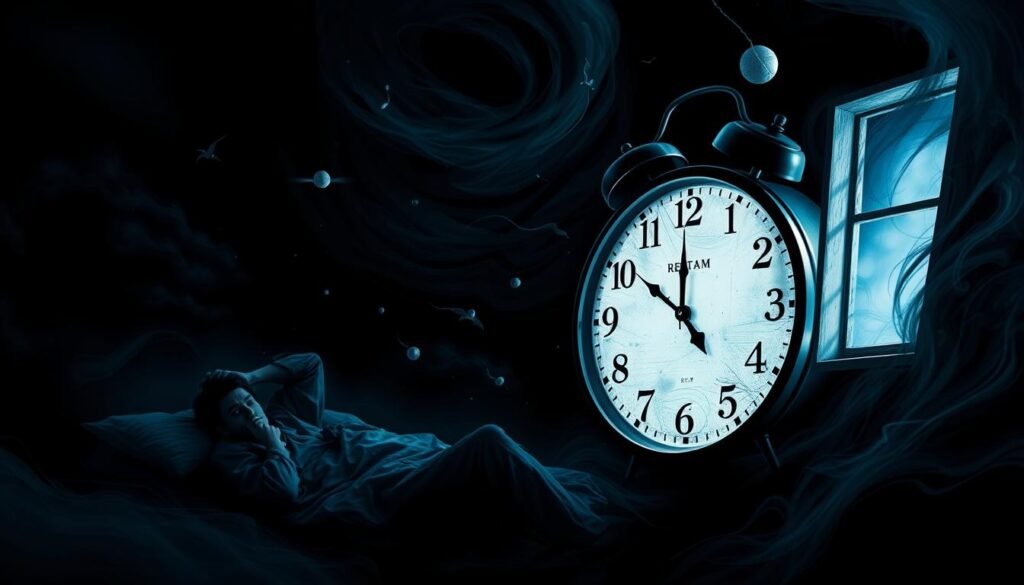About 30% of people say they have trouble sleeping. Out of these, 10% feel tired during the day because of it. Insomnia is a big problem for many, impacting more than just their energy levels. In treating insomnia, many find help through cognitive behavioral therapy for insomnia (CBT-I). This method focuses on fixing sleep problems by looking at thoughts, actions, and surroundings.
Key Takeaways
- CBT-I typically involves 6-8 sessions tailored to individual needs.
- Studies show 70-80% improvement in patients using multicomponent CBT-I techniques.
- Relaxation techniques can reduce anxiety during CBT-I.
- CBT-I offers sustainable benefits like decreased sleep onset time and fewer night awakenings.
- Economic costs for diagnosed insomniacs exceed $1,000 annually compared to non-insomniacs.
Understanding Insomnia
Insomnia is a common sleep problem that makes it hard to fall or stay asleep. It can lead to feeling tired and moody during the day. About 30 million Americans have insomnia, showing how common it is.
It can come from stress, health issues, or lifestyle choices. People with clinical depression are especially likely to have insomnia. That’s because their sleep patterns are often disrupted.
Treating insomnia well means finding out why it’s happening. Cognitive Behavioral Therapy for Insomnia (CBT-i) is a top method. It helps people change negative thoughts about sleep. Studies show CBT-i is more effective than just using sleep meds.
With 70 million Americans facing sleep problems, it’s important to find good help. But, there aren’t many specialists in behavioral sleep medicine. People with insomnia may have to look hard for the right help.
Types of Insomnia and Their Effects
There are mainly two kinds: chronic insomnia and short-term insomnia. Chronic insomnia goes on for more than three months. It happens at least three times a week. About 10% of people face it. It is often linked with health issues like diabetes and heart problems. These can cause trouble with thinking and mood changes.
Short-term insomnia lasts less than three months. Up to 30% of people might experience it each year. It’s mainly due to stress or things around us.
Insomnia’s effects go way beyond just feeling tired. It can lead to doing poorly at school or work. There’s a higher chance of getting into accidents too. People with long-lasting insomnia might struggle with mental health issues. Depression and anxiety are common. They can also have physical health problems.
With the impact being so big, finding the right treatment is important. There are many types of insomnia, and treatment needs to match the condition.
Knowing if insomnia is chronic or short-term helps choose treatments. Cognitive behavioral therapy for insomnia (CBT-I) is a top choice for long-lasting cases. It aims to make sleep better through structured steps.

The Importance of Sleep Hygiene
Sleep hygiene is about habits that help you sleep well every night. It’s key for fighting insomnia, keeping a good sleep cycle, and feeling better overall.
A study from Tabuk city in Saudi Arabia showed how important these habits are. It found that 76.5% of people with bad sleep habits had trouble sleeping in the last three months. Yet, only 56.1% of those with good habits had the same problems. This shows how crucial good sleep habits are.
Not sleeping well doesn’t just affect your nights. Those with poor sleep habits often feel very tired during the day. About 22.5% felt this way, unlike only 11.7% of those with better sleep habits. This can make your day harder and lower your life quality.
Here are some good sleep hygiene tips:
- Keep a regular sleep schedule.
- Avoid long naps during the day.
- Have a relaxing routine before bed.
Doing things like getting sunlight, exercising, and not having much alcohol or caffeine also help. These steps are simple and safe but make a big difference in your sleep quality.
Also, your bedroom setting matters a lot. Comfy bedding, keeping the room cool, and reducing noise and light help you sleep better.

One out of three adults struggle with insomnia, highlighting the need to take sleep hygiene seriously. With insomnia on the rise in America, using these good practices can greatly improve your health.
| Sleep Hygiene Factor | Impact on Sleep Quality |
|---|---|
| Regular Sleep Schedule | Promotes a stable circadian rhythm |
| Bedtime Routine | Encourages relaxation before sleep |
| Bedroom Environment | Enhances comfort and minimizes disturbances |
| Daily Light Exposure | Supports natural sleep-wake cycles |
| Physical Activity | Improves overall sleep quality |
| Limit Stimulants | Reduces difficulties in falling asleep |
What is Cognitive Behavioral Therapy for Insomnia?
Cognitive Behavioral Therapy for Insomnia (CBT-I) is a powerful way to fight sleep problems. It looks at the thoughts and actions that hurt our sleep. The goal of CBT-I is to make your sleep better by changing how you think about sleep. It helps with regular insomnia and insomnia linked to other issues, like mood disorders.
CBT-I has several key parts to help you sleep better. These parts work together:
- Sleep Hygiene: Creating good bedtime habits.
- Stimulus Control: Making your bed a place just for sleep.
- Sleep Restriction: Cutting down time in bed to increase sleep quality.
- Relaxation Training: Learning ways to relax your mind and body.
- Cognitive Therapy: Changing negative thoughts about sleep.
One interesting method in CBT-I is Paradoxical Intention. It suggests staying awake on purpose. This lowers the worry about falling asleep. Together, these methods make a full plan to help you sleep well.
CBT-I has shown great results for people who have trouble starting or staying asleep. This is important when sleep issues hurt their daily lives. Studies show 6% to 10% of adults have chronic insomnia. This number goes up for those with other health problems.

Getting help through psychotherapy can lead to better sleep patterns. This path also deals with mental health issues, building a lasting good sleep relationship.
Insomnia Treatment Psychology: The Role of Thought Patterns
Insomnia treatment psychology focuses on changing negative thought patterns. These patterns can make sleep problems worse. About 6–10% of people have chronic insomnia. They may think in ways that keep them awake. Therapies help change these unhealthy thoughts into healthier ones.
Identifying Negative Thoughts About Sleep
Knowing the negative thoughts about sleep is important. These thoughts might stop people from sleeping well. For instance, some fear they can’t fall asleep. This fear can lead to bad sleep habits. A sleep journal is a good tool. It helps track sleep-related thoughts and behaviors. This is a key step towards better sleep habits.
Challenging Dysfunctional Beliefs
It’s important to challenge and change dysfunctional beliefs. Cognitive-behavioral therapy for insomnia (CBT-I) does this well. CBT-I helps patients have realistic ideas about sleep. It works on thoughts that make relaxation hard. This therapy is shown to reduce anxiety and improve sleep. Studies show this can lead to better sleep and overall well-being.
Behavioral Interventions for Sleep Problems
Behavioral interventions are key for better sleep. They target insomnia’s symptoms and tackle behaviors that cause poor sleep. Learning about stimulus control and sleep restriction can deeply improve sleep health.
Stimulus Control Techniques
Stimulus control plays a big role in curing sleep problems. It trains people to see their bedroom as a place for sleep and intimacy, not for watching TV or eating. The main parts of stimulus control include:
- Going to bed only when feeling sleepy.
- Out of bed if unable to sleep within 15-20 minutes.
- Avoiding daytime naps to strengthen nighttime sleep drive.
- Waking up at the same time each day, regardless of how much sleep was obtained.
This approach helps create a steady sleep pattern. It turns the bed and bedroom into sleep signals. For more info, check out resources on CBT for insomnia that use these methods.
Sleep Restriction Strategy
Sleep restriction is vital for solving insomnia. Simply put: the more you’re awake, the sleepier you’ll get. Sleep restriction involves:
- Limiting the total time spent in bed to match actual sleep time.
- Gradually increasing time in bed as sleep quality improves.
- Creating a stronger sleep drive by reducing time awake in bed.
This method helps people fall asleep faster and improves sleep quality. Strategies like these are central to treating insomnia effectively.
| Strategy | Description | Benefits |
|---|---|---|
| Stimulus Control | Associating the bedroom with sleep only. | Improves sleep onset and quality. |
| Sleep Restriction | Reducing time in bed to match sleep duration. | Increases sleep drive and reduces wakefulness. |
Relaxation Techniques to Improve Sleep
Struggling with sleep? Relaxation techniques could be your answer. They offer a way to calm your mind and body at night. Techniques like deep breathing, muscle relaxation, and guided meditation can make a big difference. They help by reducing stress and making it easier to fall asleep.
Breathing Exercises
Breathing exercises can greatly relax you and help with sleep troubles. Diaphragmatic breathing is one quick way to lower stress before bed. The 4-7-8 method is especially effective. You inhale for four seconds, hold your breath for seven, then exhale for eight. This technique quiets your thoughts and readies your body for sleep.
Progressive Muscle Relaxation
With progressive muscle relaxation, you tense and then relax your muscles one by one. This releases physical tension, helping you relax more fully. Practicing this for 20 to 25 minutes every day can lessen anxiety. It makes it easier for you to drift off to sleep.
Meditation and Mindfulness Practice
Mindfulness and meditation can stop sleep-disturbing thoughts in their tracks. Techniques like guided imagery encourage a peaceful mind-set. They help you stay in the now, easing you into restful sleep. Adding these to your routine can greatly improve your sleep quality. To find out more about these techniques, check out this detailed guide on relaxation techniques for better sleep.
| Technique | Description | Benefits |
|---|---|---|
| Breathing Exercises | Controlled breathing patterns like 4-7-8 to promote relaxation. | Reduces anxiety, lowers heart rate, and prepares the body for sleep. |
| Progressive Muscle Relaxation | Tensing and then relaxing muscle groups to alleviate tension. | Enhances physical relaxation, aiding in the transition to sleep. |
| Meditation and Mindfulness | Practices focusing on the present moment and calming the mind. | Improves sleep quality by managing racing thoughts and reducing stress. |
Exercise and Its Impact on Sleep
Being active is key to better sleep and solving insomnia. Regular workouts help people with insomnia by enhancing how they sleep. Learning about exercise’s effect on sleep gives important ideas on how to manage insomnia.
How Physical Activity Promotes Better Sleep
Many studies show that adults with insomnia improve with exercise. Doing moderate aerobics makes them fall asleep 13 minutes faster and adds 18 minutes to their sleep after 4 weeks. Exercise can match sleeping pills in fighting insomnia. Plus, keeping up with workouts helps avoid sleep problems later in life.
Choosing the Right Type of Exercise
Adding exercise to your day is crucial for sleep. Activities like fast walking, biking, or swimming at moderate intensity work best for those with insomnia. Doing these workouts for 30 minutes, three times a week for eight weeks, greatly boosts sleep quality. Exercising in the morning or late afternoon is equally good. Also, mixing workouts with relaxation techniques improves results even more.
| Type of Exercise | Duration | Benefits for Sleep |
|---|---|---|
| Moderate Aerobic | 30 minutes, 3 times a week | Improves sleep duration and quality |
| Light Physical Activity | 10 minutes (daily) | Adds minutes to overall daily sleep time |
| Walking/Cycling | Any duration | Reduces pre-sleep anxiety, promotes relaxation |
Conclusion
Insomnia treatment psychology offers important strategies for those facing sleep issues. It shows how thoughts, behaviors, and sleep work together. This helps in creating successful methods to sleep better. Cognitive behavioral therapy for insomnia (CBT-I) has proven to be a key solution, helping many to enjoy better nights and a better life.
CBT-I is the top choice recommended by sleep groups, as research shows. It helps people fall asleep faster and wake up less during the night. Plus, a study found CBT-I’s effects are as good as sleep meds but last longer. After finishing CBT-I, people keep sleeping well. You can learn more about sleep disorders therapy here.
Adding behavior changes, relaxation, and exercise to your day can fight insomnia in many ways. CBT-I helps 70-80% of patients, making it a great choice for better sleep. As more people learn about insomnia treatment psychology, more can enjoy peaceful nights and improved health.